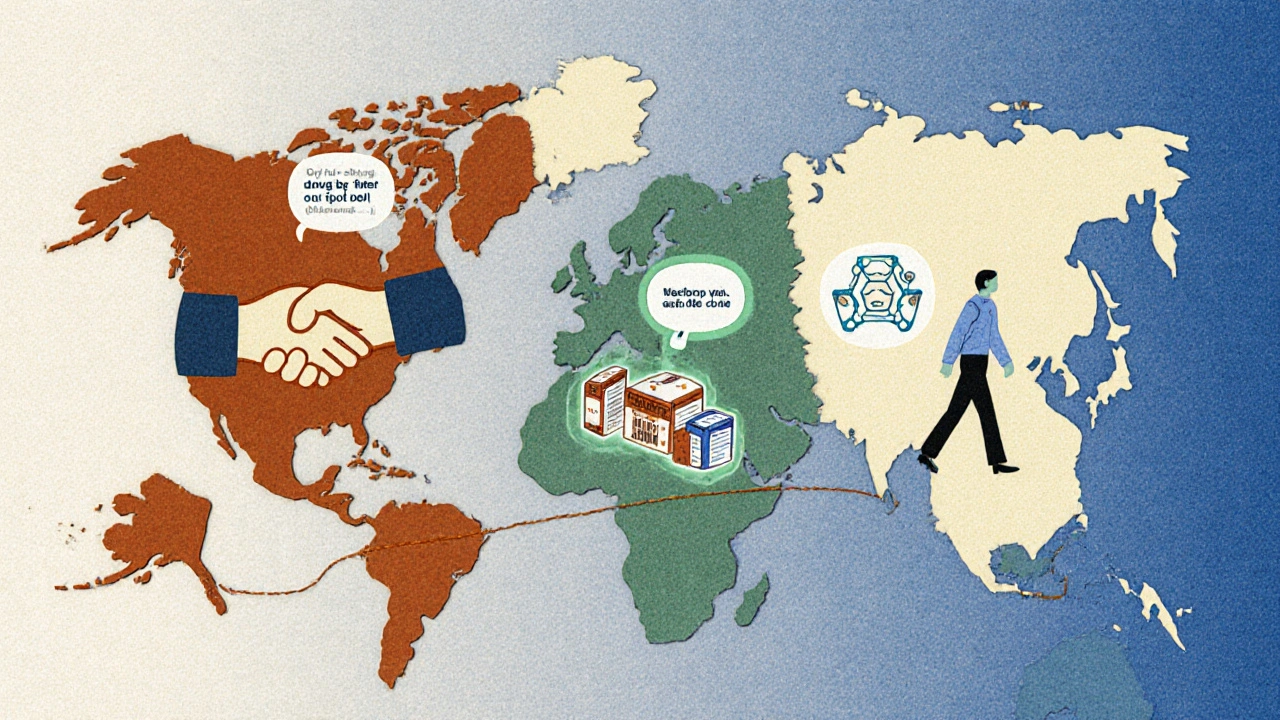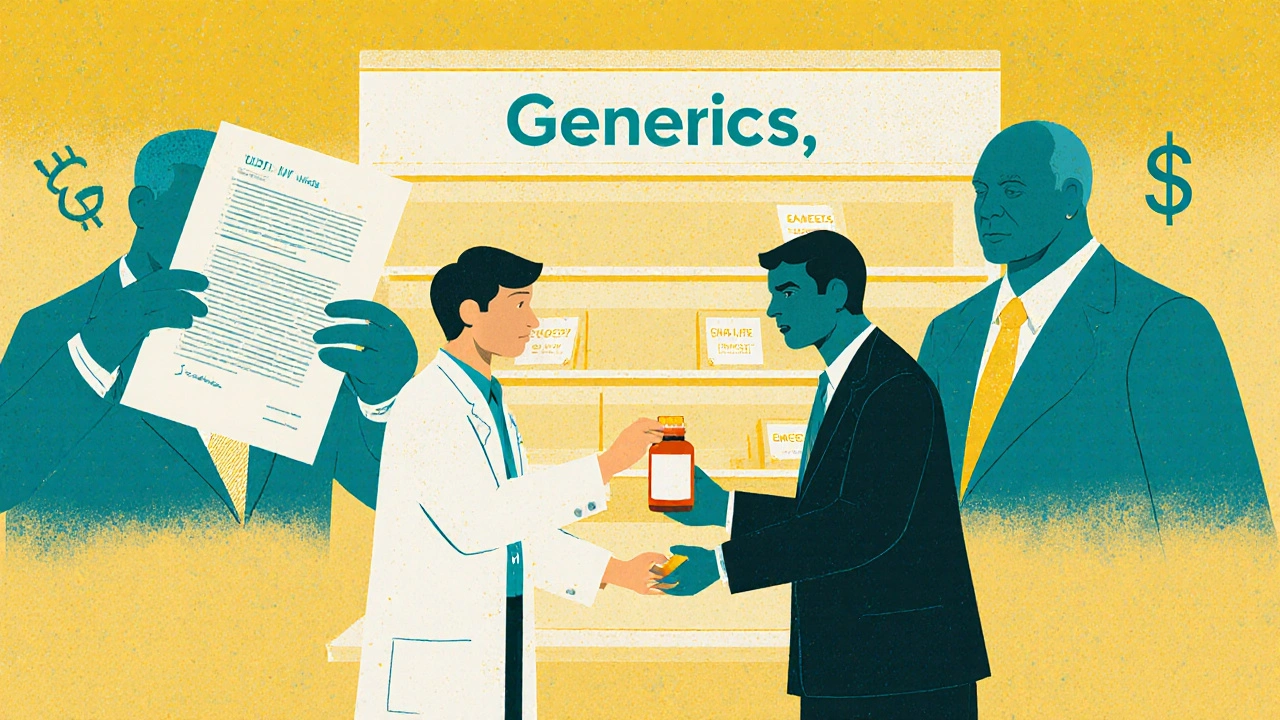When you walk into a pharmacy and pick up a generic version of your prescription drug, you’re probably not thinking about lawyers, patents, or courtrooms. But behind that $5 bottle of generic lisinopril is a decades-long battle over competition - one shaped by antitrust laws that decide who gets to sell medicine, when, and at what price.
How Generic Drugs Got Their Start
Before 1984, bringing a generic drug to market was slow, expensive, and often blocked by branded drug companies. The system was stacked in favor of the original makers. If you wanted to make a copy of a drug like Prilosec or Lipitor, you had to redo all the safety and effectiveness tests - even though the original company had already proven them. That changed with the Hatch-Waxman Act a 1984 U.S. law that created a fast-track path for generic drugs while protecting branded drug patents. The law let generic companies file an Abbreviated New Drug Application (ANDA) - skipping costly clinical trials - as long as they proved their version was the same as the branded one. But here’s the twist: if a generic company challenged a patent (called a Paragraph IV certification), they got 180 days of exclusive rights to be the first on the market. That meant they could charge lower prices and still make a profit - and force the branded drug maker to drop its price too. This wasn’t charity. It was economics. The result? Generic drugs went from making up just 19% of U.S. prescriptions in 1984 to over 90% by 2016. Between 2005 and 2014, Americans saved $1.68 trillion on prescriptions because of generics. In 2012 alone, that number hit $217 billion.The Dark Side of Competition: Pay-for-Delay
The system worked - until it didn’t. Some branded drug companies realized they could pay generic makers to stay away. Instead of fighting in court, they’d cut a deal: "We’ll give you millions, and you won’t launch your cheaper version." These deals are called pay-for-delay agreements where branded drug companies pay generic manufacturers to delay market entry. They’re not illegal on their face - but they’re designed to keep prices high. The FTC calls them "reverse payments" because the money flows from the brand to the generic, not the other way around. In 2013, the U.S. Supreme Court ruled in FTC v. Actavis that these deals could violate antitrust laws if they’re large and unexplained. The court didn’t ban them outright - but it said courts had to look closely at the motive. Was this a legitimate settlement, or a bribe to protect a monopoly? Since then, the FTC has pursued at least 18 pay-for-delay cases between 2000 and 2023. One of the biggest involved Gilead Sciences, which paid $246.8 million in 2023 to settle claims it blocked generic versions of its HIV drug Truvada. That’s not a fine - it’s a settlement for allegedly paying competitors not to compete.Other Tricks to Block Generic Entry
Pay-for-delay isn’t the only trick. Branded drug companies have used a whole playbook to delay generics:- Product hopping: When a patent is about to expire, the company releases a slightly changed version - maybe a new pill shape, a different release time, or a combo drug. They convince doctors and patients to switch, even if the old version still works. AstraZeneca did this with Prilosec and Nexium, and courts have called it a way to "extend a monopoly."
- Sham citizen petitions: A company files a fake complaint with the FDA, claiming safety issues with a generic drug. It’s not about safety - it’s about delay. The FDA has to respond, and that slows down approval. The FTC is currently suing Teva Pharmaceuticals for this tactic over its multiple sclerosis drug Copaxone.
- Orange Book abuse: The FDA’s "Orange Book" lists all patents for a branded drug. Some companies list patents that don’t even cover the drug - just to scare off generics. Bristol-Myers Squibb got fined in 2003 for listing patents that had nothing to do with the actual medicine.
- Restrictive distribution deals: Some brands sign contracts with pharmacies and wholesalers that block them from carrying generics. This isn’t about quality - it’s about control.

Global Differences: How Other Countries Handle It
The U.S. isn’t the only place fighting over generic drugs. The European Union has taken a harder line. The European Commission has opened 27 antitrust cases between 2018 and 2022, and 60% of them focused on delaying generic entry. One common tactic? Companies withdraw marketing authorizations in certain countries just to stop generics from entering. In Germany and France, regulators have fined companies for "strategic withdrawal" of drugs to block competition. In China, things are getting even more aggressive. On January 24, 2025, China released new Antitrust Guidelines for the Pharmaceutical Sector a 2025 rulebook identifying five hardcore anti-competitive practices in drug markets. These include price fixing, market division, and - for the first time - using AI and messaging apps to coordinate prices among generic makers. By Q1 2025, Chinese authorities had already penalized six cases, five of which involved price fixing through text messages and algorithms. The European Commission estimates that delays in generic entry cost European consumers €11.9 billion every year. That’s not just money - it’s people who can’t afford their meds.Who Gets Hurt When Competition Fails
It’s easy to think of this as a corporate battle. But the real victims are patients. When a generic drug enters the market, prices drop fast. One generic can cut prices by 20% in a year. Five generics? Up to 85% off. That’s why the Congressional Budget Office says generics reduce drug costs by 30% to 90% compared to branded versions. But when those generics are blocked - whether by pay-for-delay, product hopping, or fake petitions - people suffer. A 2022 Kaiser Family Foundation survey found that 29% of U.S. adults didn’t take their medicine as prescribed because they couldn’t afford it. That’s not laziness. That’s economics. When a $100 pill becomes a $10 pill, people take it. When it stays at $100, they skip doses, split pills, or go without. And it’s not just the U.S. In the UK, the NHS spends billions on drugs every year. When generics are delayed, that money could’ve gone to cancer screenings, mental health services, or hospital staff. Instead, it’s locked up in inflated drug prices.
What’s Being Done - and What’s Still Broken
The FTC and DOJ are still active. The 2022 workshop on "Generic Drug Entry after Patent Expiration" showed regulators are watching product hopping, patent thickets, and distribution restrictions. But enforcement is slow. Cases take years. Companies have deep pockets. And the legal system is built for complexity, not speed. Some lawmakers are pushing for change. The Prescription Drug Pricing Relief Act and the CREATES Act aim to stop distribution blocks and force companies to share samples with generics - a tactic some brands use to delay approval. But the biggest fix might be transparency. If every pay-for-delay deal had to be reported publicly - and if the FDA had to publish every patent listing with clear explanations - it would be harder to hide.What You Can Do
You might feel powerless against big pharma and complex laws. But you’re not.- Ask your pharmacist if a generic is available - and why it’s not being offered.
- Check if your insurance plan favors branded drugs over generics. If so, ask why.
- Support policies that promote generic competition. Contact your representative and ask about the CREATES Act or the proposed Generic Drug Competition Act.
- Use tools like GoodRx or SingleCare to compare prices. Sometimes, paying cash for a generic is cheaper than using insurance.
What is the Hatch-Waxman Act and how does it affect generic drugs?
The Hatch-Waxman Act of 1984 created a legal pathway for generic drug companies to bring cheaper versions of branded drugs to market without repeating expensive clinical trials. In exchange, it gives branded drug makers patent protection. The law also rewards the first generic company to challenge a patent with 180 days of exclusive sales - which encourages competition and lowers prices.
What is a pay-for-delay agreement in the pharmaceutical industry?
A pay-for-delay agreement is when a brand-name drug company pays a generic manufacturer to delay launching its cheaper version. These deals are controversial because they prevent competition, keeping drug prices high. The U.S. Supreme Court ruled in 2013 that such payments can violate antitrust laws if they’re large and lack legitimate justification.
How do generic drugs lower prescription costs?
Generic drugs lower costs because they don’t need to recoup the $1 billion+ R&D costs of the original drug. Once a generic enters the market, prices typically drop by 20% within a year. With five or more generic competitors, prices can fall by up to 85%. Between 2005 and 2014, generics saved U.S. consumers $1.68 trillion.
Why do some drug companies block generic entry?
Branded drug companies block generics to protect their profits. When a patent expires, sales of the branded drug often collapse. To avoid this, companies use tactics like pay-for-delay, product hopping, sham petitions, and restrictive distribution deals - all designed to delay competition and keep prices high.
Are antitrust laws different in the EU and China compared to the U.S.?
Yes. The EU focuses on regulatory manipulation - like withdrawing drug approvals to block generics in specific countries. China’s 2025 guidelines explicitly ban price fixing through digital platforms and AI tools, and have already penalized six cases. The U.S. focuses more on pay-for-delay and patent abuse, but all three regions are cracking down on tactics that delay generic competition.
How can consumers fight high drug prices?
Consumers can ask for generics, compare cash prices with tools like GoodRx, challenge insurance restrictions, and support legislation like the CREATES Act. Even small actions - like choosing a $10 generic over a $100 brand - add up and pressure companies to compete fairly.


Nicole M
I used to think generics were just cheaper versions of the same drug. Turns out the whole system is a minefield of legal loopholes and corporate sabotage. I had no idea companies were paying rivals not to compete. That’s not capitalism-that’s extortion with a prescription pad.
And now they’re using AI to fix prices? Next they’ll be using chatbots to convince elderly patients their $200 pill is ‘worth it.’